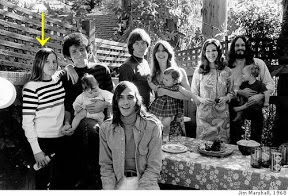December 8th in Rock & Roll History
The late Sammy Davis, Jr. (‘I’ve Gotta Be Me’) was born in 1925

The late Jim Morrison (lead singer with The Doors – ‘Light My Fire’) was born in 1943
The late Mike Botts (drummer with Bread – ‘Make It With You’) was born in 1944
The late Dan Hartman (guitarist with The Edgar Winter Group – ‘Free Ride’ and ‘I Can Dream About You’ as a solo artist) was born in 1950
Ryan Newell (lead guitar with Sister Hazel – ‘All For You’) is 42
Sinead O’ Connor (‘Nothing Compares 2 U’) is 48
Paul Rutherford (harmony vocals with Frankie Goes To Hollywood – ‘Relax’) is 55
Phil Collen (guitarist with Def Leppard – ‘Pour Some Sugar On Me’) is 57
Geoff Daking (drummer with Blues Magoos – ‘We Ain’t Go Nothin’ Yet’) is 67

Gregg Allman (‘Midnight Rider’) is 67
Bobby Elliott (drummer with The Hollies – ‘Bus Stop’) is 72
Jerry Butler (‘For Your Precious Love’) is 75
Henry Mancini recorded ‘Moon River’—1960

The Beach Boys released ‘Surfin’ (sort of)—1961
Rock Factoid: ‘Surfin‘ was actually released three times in three months on two different labels; Candix 331 in November 1961, X 301 in December 8, 1961 and Candix 301 in January 1962. The full story is complex, but in simple form, when the owners of Candix went back to the pressing plant to order more of 331, they were told to settle their bills first, so in order to maintain a flow of singles they had another plant press the record, hence the X 301 release (which is far and away the rarest of all). When sufficient cash had been raised for a further repressing on Candix, the number 301 was used.
Idle Thought: Don’t you feel better just knowing this stuff?
DJ and promoter Alan Freed appeared at his payola trial in New York City and admitted he received money from labels to play their records on the air. He was found guilty, fined $300, and given six months probation—1962
Steve Lawrence released ‘Go Away Little Girl’—1962
Frank Sinatra, Jr. was kidnapped (but was returned after his father paid a $240,000 ransom)—1963

The Rolling Stones recorded ’19th Nervous Breakdown’ at RCA Hollywood Studios—1965
Rock Factoid: “Keith said something like, ‘Why don’t you do something at the end with the bass, some kind of a lick that will fill up the space between the vocals and the band?’ I came up with that Bo Diddley thing. I just bounced the string with the top of my finger on the pickup, and ran my finger down the string. That is what created that so-called dive-bombing sound.” … Bill Wyman
Paul McCartney recorded the lead vocal for The Beatles’ ‘When I’m Sixty-Four’—1966

The Byrds recorded ‘The Girl With No Name’—1966
Rock Factoid: ‘Girl’ was married to David Freiberg of the San Francisco band Quicksilver Messenger Service when The Byrds’ Chris Hillman wrote ‘The Girl With No Name’. Her maiden name was Julia Dreyer.
“I was a dyed-in-the-wool hippie. In part they called me girl because in South Africa where I was from, that’s what they called their kids. I ran away to Mexico when I was 16. When I got back they were going to put me in juvenile hall until I was 21. In lieu of that, I got married.” … Julia Dreyer Brigden
The Beatles released ‘Magical Mystery Tour’ as a six-song double EP in the UK—1967
John Mills, Sr. (Mills Brothers – ‘Cab Driver’) died (natural causes)—1967


Traffic released their debut album (‘Mr. Fantasy’). The album reached #16 in the UK but peaked at #88 in the U.S.—1967
Rock Factoid: The first U.S. version of the album was titled ‘Heaven Is in Your Mind’ and had a cover that featured all the members of the group except Dave Mason, who had quit the band prior to the album release. It was quickly changed to the psychedelic version fans remember.

Three days after his departure from The Hollies, Graham Nash announced the formation of supergroup Crosby, Stills & Nash—1968
Rock Factoid: The trio was quickly signed by Atlantic Records but there was one slight problem. Stephen Stills was already signed to Atlantic Records through his old Buffalo Springfield contract. David Crosby had been released from his Byrds’ deal with Columbia so he was a free agent. Nash, however, was still signed to Epic Records through The Hollies. Atlantic Records president Ahmet Ertegün worked out a deal with Clive Davis of Epic to essentially trade Nash to Atlantic in exchange for Richie Furay (who was also signed to Atlantic from having been in Buffalo Springfield) and his new band Poco.

The Rolling Stones released ‘Their Satanic Majesties Request’ – an album three members of the band later dismissed as nothing special – in England—1969
Rock Factoid: “It was a load of crap. Half of it was, ‘let’s give people what we think they want.’ The other half was, ‘let’s get out of here as quickly as possible.'” … Keith Richards
“I don’t think any of the songs are very good. Okay, maybe there are two good songs on it – ‘She’s A Rainbow’ and ‘2000 Light Years From Home’. The rest of them are nonsense.”… Mick Jagger
“Every day at the studio it was a lottery as to who would turn up and what – if any – positive contribution they would make when they did. Keith would arrive with anything up to ten people, Brian with another half-a-dozen and it was the same for Mick. I hated it!” … Bill Wyman
Rock Factoid #2: As for the cover – criticized for ripping off The Beatles’ ‘Sgt. Pepper’s Lonely Hearts Club Band‘ – Keith said, “I don’t know that we were trying to copy the Beatles. It’s probably more down to the fact that we were going through the same things. Maybe we were doing it a little bit after them. We were always following them through so many scenes.”
On trial in Canada on drug possession charges, Jimi Hendrix told a Toronto court that he had only smoked pot four times in his life, snorted cocaine twice and took LSD no more than five times. He also added he had “outgrown” drugs. He was acquitted—1969
Gary Thain (bass guitar with Uriah Heep – ‘The Wizard’) died (heroin overdose)—1975
Neil Sedaka released the single ‘Breaking Up Is Hard to Do’. It was a slower version of his 1962 hit of the same name—1975
A benefit concert (“A Night of The Hurricane”) was held at Madison Square Garden. The last date on Bob Dylan’s Rolling Thunder Revue tour, the show featured many non-musical celebrities and raised over $100,000 for the release of wrongly imprisoned boxer “Hurricane” Carter, who took part by calling the stage from jail—1975

John Lennon was murdered outside the Dakota building, his home in New York City—1980
Rock Factoid: On his way to a recording session, Lennon graciously autographed the killer’s copy of ‘Double Fantasy’ (shown above). Hours later, the same man shot Lennon in the back as John approached the steps to the building’s main entrance. Lennon died from blood loss en route to Roosevelt Hospital. … and no, I never type the killer’s name. The little bastard has garnered enough attention.
‘Big’ Walter Horton (one of the best harmonica players in the history of the blues – ‘Easy’) died (heart failure)—1981

Marty Robbins (‘El Paso’) died (heart failure due to surgical complications)—1982
One time Coasters manager Patrick Cavanaugh was convicted of the first degree murder of group member Buster Wilson whose dismembered body was discovered in Modesto, CA in 1980. Wilson had threatened to notify authorities of Cavanaugh’s intent to buy furniture with stolen checks. Cavanaugh was given the death sentence but that was later commuted to life in prison—1984

Nicholas ‘Razzle’ Dingley (drummer with Hanoi Rocks – ‘Until I Get You’) was killed in an auto accident—1984
Rock Factoid: The driver of the car was Mötley Crüe lead singer Vince Neil. His blood alcohol level was .17, well above the California legal limit of .08 when he lost control of his car and hit an oncoming vehicle. Neil was subsequently sentenced to 30 days in jail, five years probation, $2.6 million in restitution to the victims of the crash (Dingley’s estate and the two occupants of the other car) and 200 hours of community service.
Herbert (Toubo) Rhoad (The Persuasions – ‘Tryin’ To Throw Your Arms Around The World’) died (stroke)—1988
Antonio Carlos Jobim (a primary force behind the creation of the bossa nova genre; he wrote ‘The Girl from Ipanema’) died (cardiac arrest)—1994
The Grateful Dead officially disbanded, four months after the death of Jerry Garcia—1995
The FBI released nearly 1,300 pages of the secret files it kept on Frank Sinatra, detailing his ties to organized crime, allegations that he was a Communist Party sympathizer, and that he dodged the draft—1998
Carlos Santana, at a press conference in Mexico City, stated that while he was praying in church, the Virgin of Guadalupe spoke to him. He added, “Marijuana is not a drug and if factories are set up here to make clothes, tofu cheese, medicine, and paper from marijuana, we won’t have to chop down so many trees.”—1999

Ozzy Osbourne fractured a collarbone, eight ribs and one of the vertebrae in his neck in an all-terrain vehicle accident on his estate in Buckinghamshire, England—2003
Rock Factoid: “The last thing I remember is I got on the bike and something in my mind went, ‘Bad move. Something really bad is gonna happen.'”
Dimebag Darrell (born Darrell Abbott – lead guitarist with Damageplan – ‘Moment Of Truth’) died (shot to death while onstage; four others were also killed)—2004
Dan ‘Bee’ Spears (bass guitar with Willie Nelson’s Family Band – ‘If You’ve Got The Money I’ve Got the Time’) died (exposure, after falling outside his home)—2011
Dick Sims (keyboards with Eric Clapton – ‘I Shot The Sheriff’) died (cancer)—2011
John Wyker (singer/songwriter with Sailcat – ‘Motorcycle Mama’) died (congestive heart failure)—2013
Compiled by Ray Lemire ©2014 RayLemire.com. All Rights Reserved.
You may not, under any circumstances, reproduce, record, publish, republish, post, transmit, publicly display, publicly exhibit or distribute any articles or photographs on RayLemire.com without obtaining the express written consent of the Operator.
